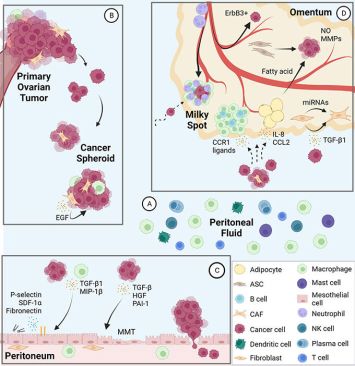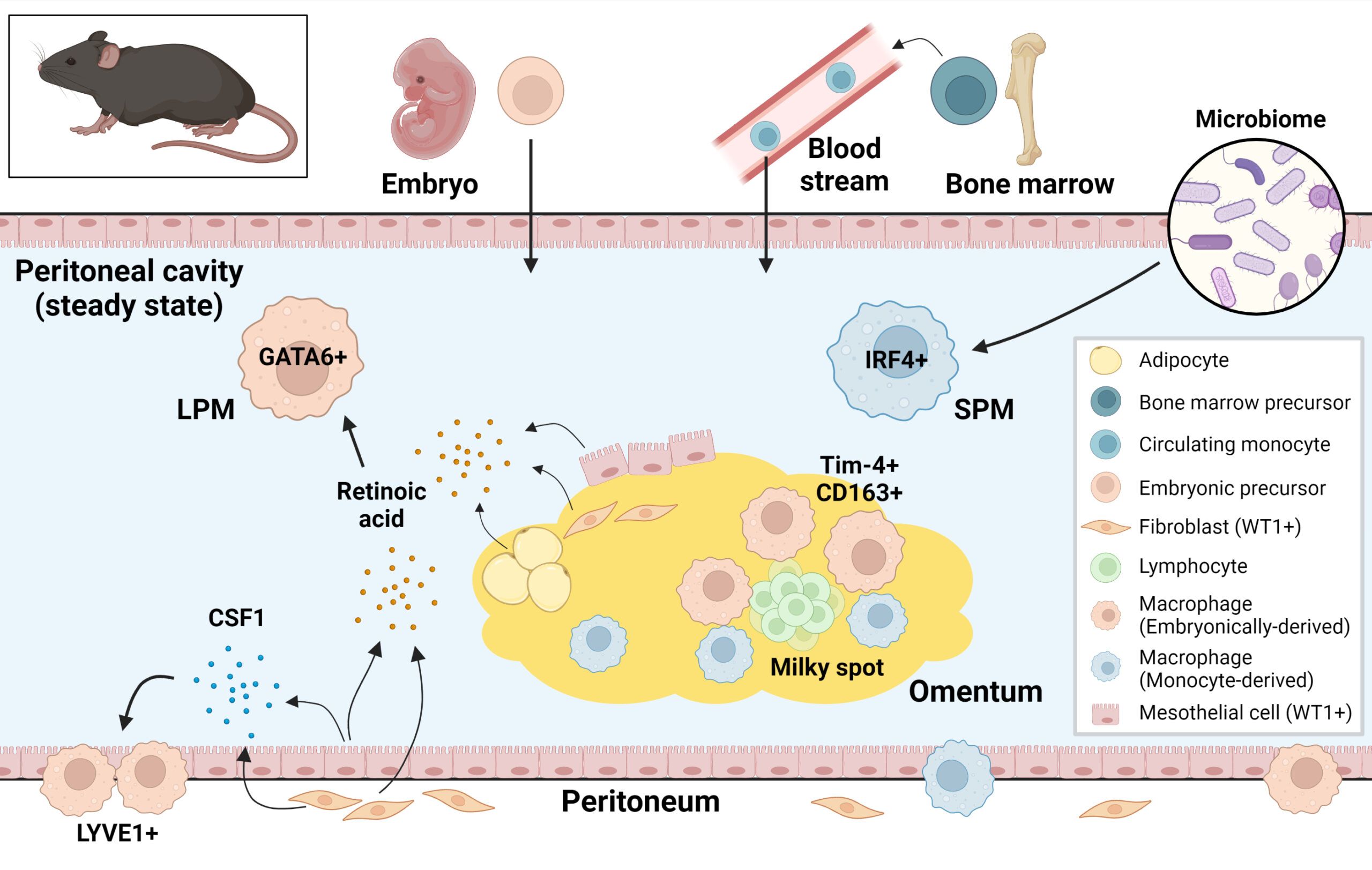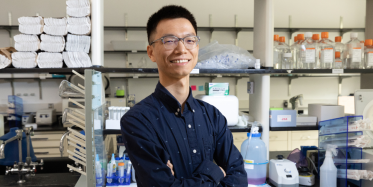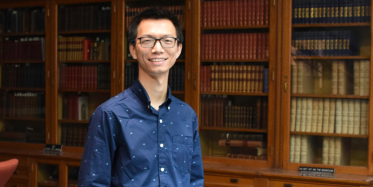Nan Zhang, Ph.D.
-
Assistant Professor, Molecular and Cellular Oncogenesis Program, Ellen and Ronald Caplan Cancer Center
- Scientific Director, Imaging Facility
Zhang studies the role of immune cells called macrophages in tumor growth and metastasis in the abdominal cavity.
Zhang received his B.S. in microbiology and immunology from Shandong University, China, and a Ph.D. in biochemistry and molecular biology from the University of Oklahoma Health Sciences Center. He completed his postdoctoral training in the Department of Pathology and Immunology of Washington University School of Medicine and joined The Wistar Institute in 2021 as an assistant professor.
The Zhang Laboratory

The Zhang Laboratory
Macrophages are currently considered as highly heterogenous and plastic with different developmental origins and microenvironmental signatures.
The Zhang lab focuses on understanding how macrophages regulate tumor growth and metastasis in the peritoneal space. We use single-cell sequencing, ATAC sequencing, large-scale imaging, multiphoton intravital imaging, novel genetic mouse models, and patient samples to understand how different subsets of macrophages function differently in mice and in humans. Our long-term goal is to develop novel macrophage-based immunotherapies to treat peritoneal cancers.
-
Postdoctoral Fellows
Brennah Murphy, Ph.D.
Yujie Ye, Ph.D. -
Graduate Student
Bryan Manning (USciences)
-
Postdoctoral fellow/research assistant positions are available in the Zhang laboratory with a research focus on peritoneal immunity against carcinomatosis using mouse models.
Candidates should have recently received or be close to obtaining their Ph.D. degree or equivalent (for postdoc) or B.S. degree or equivalent (for RA) and have a strong background in one or more of the following disciplines: immunology, tumor microenvironment, biochemistry, and molecular biology. Interested applicants are invited to email nzhang@wistar.org.
Research
Part of my lab focuses on the role of myeloid cells, including neutrophils and macrophages, in cancer progression, particularly metastatic ovarian cancer. The goal is to find novel myeloid cell-based immunotherapies to treat or cure metastases in combination with immune checkpoint therapies or conventional chemotherapy or radiotherapy. Currently, we focus on treating metastatic ovarian cancer by activating myeloid cells using clinically relevant syngeneic mouse models and humanized mouse models.
The other part of my lab focuses on understanding how macrophage heterogeneity forms in the steady state and in disease conditions. We are currently investigating the microenvironmental factors that regulate macrophage subsets in the peritoneal cavity, lung, and liver.
The major techniques in the lab include genetic mouse models, flow cytometry, ELISA, multiple types of fluorescence imaging (including multiphoton intravital imaging), single-cell RNA sequencing, spatial transcriptomics, proteomics, metabolomics, and bioinformatics.
There are currently three directions in the lab:
1. Understanding myeloid activation therapy in metastatic ovarian cancer.
2. Investigating the role of myeloid cells in chemoresistance in metastatic ovarian cancer.
3. Defining the microenvironmental factors that control macrophage heterogeneity.
-
Postdoctoral Fellows
Brennah Murphy, Ph.D.
Yujie Ye, Ph.D. -
Graduate Student
Bryan Manning (USciences)
-
Former Lab Members
Taito Miyamoto, M.D., Ph.D. (Assistant Professor, Kyoto University)
-
Postdoctoral fellow/research assistant positions are available in the Zhang laboratory with a research focus on peritoneal immunity against carcinomatosis using mouse models.
Candidates should have recently received or be close to obtaining their Ph.D. degree or equivalent (for postdoc) or B.S. degree or equivalent (for RA) and have a strong background in one or more of the following disciplines: immunology, tumor microenvironment, biochemistry, and molecular biology. Interested applicants are invited to email nzhang@wistar.org.

Figure 1. Intraperitoneal metastasis of ovarian cancer. (A) Immune cell populations represented in the peritoneal fluid; macrophages represent the largest population followed by T cells, dendritic cells, mast cells, NK cells, and B cells. (B) Ovarian cancer cells metastasize via detaching from the primary tumor to form multicellular spheroids containing various stromal cells in the peritoneal fluid and seed in pro-tumor secondary sites including the peritoneum (C) and omentum (D). EGF, epidermal growth factor; TGF, transforming growth factor; MIP, macrophage inflammatory protein; MMT, mesothelial-to-mesenchymal transition; SDF, stromal cell-derived factor; hepatocyte growth factor (HGF); PAI, plasminogen activator inhibitor; CCR, C-C motif chemokine receptor; CCL, C-C motif chemokine ligand; NO, nitric oxide; MMP, matrix metalloproteinase; CAF, cancer associated fibroblasts; ASC, adipose-derived stromal cells.

Figure 2. Murine resident peritoneal macrophages and their supporting environment at steady state. Both embryonically-derived and monocyte-derived resident macrophages are present in murine peritoneal cavity at steady state. These resident macrophages from different origins are regulated differently in the tissue-specific niche. LPM, large peritoneal macrophage; SPM, small peritoneal macrophage; CSF1, colony stimulating factor 1; WT1, Wilms tumor 1.
Zhang Lab in the News
Selected Publications
Myeloid activation clears ascites and reveals IL27-dependent regression of metastatic ovarian cancer
Murphy, B., Miyamoto, T., Manning, B. S., Mirji, G., Ugolini, A., Kannan, T., Hamada, K., Zhu, Y. P., Claiborne, D. T., Huang, L., Zhang, R., Nefedova, Y., Kossenkov, A., Veglia, F., Shinde, R., & Zhang, N. Myeloid activation clears ascites and reveals IL27-dependent regression of metastatic ovarian cancer. J Exp Med. 2024 Dec 2;221(12):e20231967. doi: 10.1084/jem.20231967.
Human Serous Cavity Macrophages and Dendritic Cells Possess Counterparts in the Mouse with a Distinct Distribution Between Species.
Han J, Gallerand A, Erlich EC, Helmink BA, Mair I, Li X, Eckhouse SR, Dimou FM, Shakhsheer BA, Phelps HM, Chan MM, Mintz RL, Lee DD, Schilling JD, Finlay CM, Allen JE, Jakubzick CV, Else KJ, Onufer EJ, Zhang N, Randolph GJ. Human serous cavity macrophages and dendritic cells possess counterparts in the mouse with a distinct distribution between species. Nat Immunol. 2024 Jan;25(1):155-165. doi: 10.1038/s41590-023-01688-7. Epub 2023 Dec 15. PMID: 38102487.
LYVE1+ Macrophages Of Murine Peritoneal Mesothelium Promote Omentum-independent Ovarian Tumor Growth.
Zhang, N., Kim, S. H., Gainullina, A., Erlich, E.C., Onufer, E.J., Kim, J., Czepielewski, R.S., Helmink, B.A., Dominguez, J.R., Saunders, B.T., et al. “LYVE1+ Macrophages Of Murine Peritoneal Mesothelium Promote Omentum-independent Ovarian Tumor Growth.” J Exp Med. 2021 Dec 6;218(12):e20210924. doi: 10.1084/jem.20210924. Epub 2021 Oct 29.
Expression Of Factor V By Resident Macrophages Boosts Host Defense In The Peritoneal Cavity.
Zhang, N., Czepielewski, R.S., Jarjour, N.N. , Erlich, E.C., Esaulova, E., Saunders, B.T., Grover, S.P., Cleuren, A.C., Broze, G.J., Edelson, B.T., et al. “Expression Of Factor V By Resident Macrophages Boosts Host Defense In The Peritoneal Cavity.” J Exp Med. 2019 Jun 3;216(6):1291-1300. doi: 10.1084/jem.20182024. Epub 2019 May 2.
Blocking Neutrophil Integrin Activation Prevents Ischemia-reperfusion Injury.
Yago, T., Petrich, B.G., Zhang, N., Liu, Z., Shao, B., Ginsberg, M.H., McEver, R.P. “Blocking Neutrophil Integrin Activation Prevents Ischemia-reperfusion Injury.” J Exp Med. 2015 Jul 27;212(8):1267-81. doi: 10.1084/jem.20142358. Epub 2015 Jul 13.


